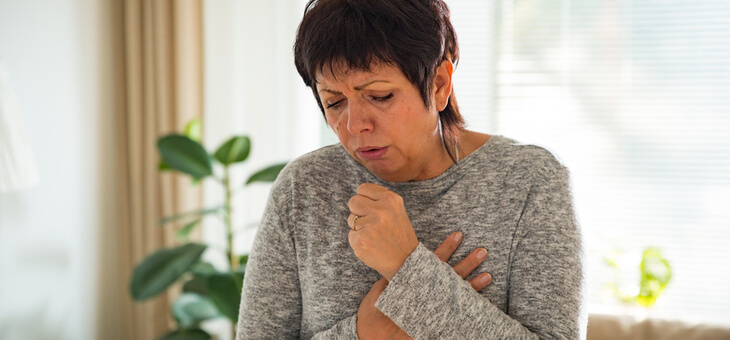In a startling turn of events, an ancient disease that many may consider a relic of the past has reclaimed its notorious title as the world’s leading cause of death from an infectious disease, surpassing COVID-19.
This resurgence is a stark reminder that despite the incredible medical advancements of the 21st century, humanity is still grappling with age-old health threats.
You May Like
According to the World Health Organisation (WHO), approximately 10.8 million individuals contracted it in 2023, and a staggering 1.25 million succumbed to the illness.
These numbers are not just statistics; they represent countless families and communities torn apart by a disease that is both preventable and curable.
Tuberculosis or TB is caused by an airborne pathogen that is spread through the simple acts of coughing, sneezing, or speaking by someone who is infected.
The bacteria responsible for TB can be expelled into the air in tiny droplets by coughing or sneezing and inhaled by others, leading to new infections. The primary battleground for TB is the lungs, where it can cause severe respiratory issues and, if left untreated, death.
The treatment for TB, while effective, is a lengthy and arduous process, often requiring a combination of antibiotics.
Patients typically undergo several months of treatment, which can extend beyond a year in some cases. This long duration, coupled with the unpleasant side effects of the medications, makes adherence to the treatment regimen a significant challenge.
Complicating matters further, the TB bacteria have demonstrated a frightening ability to evolve. Some strains have developed resistance to the antibiotics used to treat them, a phenomenon known as antimicrobial resistance.

This resistance is not just a problem for TB; it’s a growing global health crisis that the WHO has identified as one of the top threats to public health and development worldwide.
In 2020, 1,611 TB cases were reported in Australia according to Department of Health and Aged Care data. This represents around 6.3 cases for every 100,000 Australians annually.
The University of Queensland’s Professor Antje Blumenthal shed light on the pervasiveness of TB, revealing that a quarter of the global population carries the TB bacteria. ‘The bacteria have been with us for thousands of years and they are really well adapted to survive and thrive in our bodies,’ she added.
However, carrying the bacteria does not necessarily mean one will develop the disease. The bacteria have coexisted with humans for millennia, adapting to survive within our bodies without always causing illness.
When TB does manifest as a disease, it requires a robust response. Professor Blumenthal emphasises the need for new knowledge and strategies to combat TB more effectively. This could mean developing new antibiotics or enhancing the body’s immune response to better control the bacteria.
The ultimate goal is to create treatments that are quicker, have fewer side effects, and can be used in conjunction with existing antibiotics to improve outcomes for patients.
It’s crucial to be aware of the risks posed by TB, especially given the ease with which it can spread. While Australia has relatively low rates of TB compared to some other parts of the world, global travel and migration can quickly change the landscape of infectious diseases.
So, what can you do to protect yourself and your loved ones? Firstly, be aware of the symptoms of TB, which include a persistent cough, chest pain, fever, and night sweats. If you experience these symptoms, seek medical advice promptly.
Additionally, maintaining a healthy immune system through a balanced diet, regular exercise, and adequate sleep can help your body fend off infections.
As we continue to navigate the aftermath of the COVID-19 pandemic, let us not forget the other invisible enemies that still lurk among us.
Stay informed, stay vigilant, and support efforts to develop new treatments and vaccines that can help turn the tide against TB.
Have you or someone you know been affected by this disease? What measures do you think should be taken to combat its spread?
Your insights are valuable to us, as we strive to keep our community informed and engaged on important health issues.
Also read: Lung cancer rates surge in young, non-smoking women: What could be the cause?


Well Well ,both Oz & NZ just about eradicated TB years ago through school inoculation, and now that we are bringing in all the immigration from overseas without properly screening them has to be partly to blame, oh! Don’t forget the shortage of housing
A certain red headed female Australian politician has warned us about how TB comes into Australia and she got vilified for lifting the lid and called a xenophobe for it. At the time I worked adjacent to a major hospital in Brisbane and often mixed with the medical staff in the hospital cafeteria.
TB is still endemic in many SE Asian and Middle East and African countries and it appears that many “refugees’ are getting fast tracked into Australia. Without having had a specific Mantou test to confirm their TB status.
The present leftist Australian Government will do everything in its’ power to keep it quiet about which countries the carriers are coming from and we won’t hear when people end up being categorised as “dangerous to public health”. (My father contracted TB as a result of his service in PNG during WW2 and he was listed as such and everyone who had had social contact with him and his family at certain times had to be tested to ensure there was no spread.)